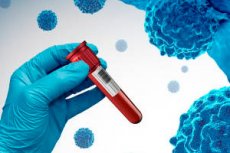New publications
New ultra-sensitive blood test predicts breast cancer recurrence months or years before it returns
Last reviewed: 02.07.2025

All iLive content is medically reviewed or fact checked to ensure as much factual accuracy as possible.
We have strict sourcing guidelines and only link to reputable media sites, academic research institutions and, whenever possible, medically peer reviewed studies. Note that the numbers in parentheses ([1], [2], etc.) are clickable links to these studies.
If you feel that any of our content is inaccurate, out-of-date, or otherwise questionable, please select it and press Ctrl + Enter.

A new blood test can predict breast cancer recurrence in high-risk patients months or even years before it occurs again, a new study has found.
A team from the Institute of Cancer Research London has used an ultra-sensitive liquid biopsy to detect small remnants of cancer DNA in the body after treatment for early-stage breast cancer.
The results, presented at the American Society of Clinical Oncology ( ASCO ) annual meeting in Chicago on June 2, included an analysis of blood samples from the ChemoNEAR study for circulating tumor DNA (ctDNA), which is released into the blood by cancer cells.
Researchers from the Toby Robins Breast Cancer Research Centre at the Institute of Cancer Research London were able to identify all patients who later relapsed by detecting very low levels of cancer DNA in the blood, known as molecular residual disease.
Discovery of a large number of cancer mutations
By identifying patients most likely to recur, the scientists hope the findings will help develop a new strategy for treating recurrent breast cancer, allowing treatment to begin much earlier, before the disease has progressed to a stage that is visible on scans.
While previous studies have shown that ctDNA blood tests can detect relapse long before it is detected on a scan, most tests use whole exome sequencing (WES), which focuses on exons — the regions of genes that code for proteins directly linked to disease.
The study used whole genome sequencing (WGS), which allowed scientists to detect up to 1,800 mutations, significantly increasing the sensitivity of the method and allowing them to identify a greater number of cancerous changes in a patient's DNA.
Blood samples and test results
Blood samples from 78 patients with different types of early breast cancer (23 with triple-negative breast cancer, 35 with HER2+ breast cancer, 18 with hormone receptor-positive breast cancer, and two with unknown subtype) were tested for ctDNA.
Samples were collected from women at diagnosis, before starting therapy, after the second cycle of chemotherapy, after surgery, and every three months during the first year of follow-up. Samples were then collected every six months for the next five years.
Identifying patients most likely to relapse
The results showed that ctDNA detection at any time after surgery or during follow-up was associated with a high risk of future recurrence and reduced overall survival.
Molecular residual disease was detected in all 11 patients who relapsed. The median time to clinical relapse in this group of patients was 15 months, three months longer than current testing for all breast cancer types. The longest time to clinical relapse was 41 months.
None of the 60 women who had ctDNA detected relapsed during the follow-up period. Three patients had ctDNA detected during follow-up but had not relapsed by the end of the study. Median survival for patients with ctDNA detected was 62 months, while median survival was not reached for patients who had ctDNA detected.
Prospects and further research
"This proof of concept retrospective study lays the foundation for better monitoring after treatment and potentially life-extending treatments for patients," said Dr Isaac Garcia-Murillas, a research fellow in the Molecular Oncology Group at the Institute of Cancer Research London.
"Cancer cells may remain in the body after surgery and other treatments, but they may be so few in number that they are not detected on subsequent scans. These cells can cause breast cancer to recur in patients many years after initial treatment. Ultra-sensitive blood tests may offer a better approach for long-term monitoring of patients at high risk of recurrence," he added.
Professor Nicholas Turner, professor of molecular oncology at the Institute of Cancer Research London and consultant oncologist at The Royal Marsden NHS Foundation Trust, said: "Testing a patient's blood for ctDNA will allow clinicians to diagnose cancer returning at a very early stage. However, more research and testing is needed before we can demonstrate that detecting molecular residual disease can guide therapy in the future."
Professor Christian Helin, director general of the Institute of Cancer Research London, added: "Breast cancer is much easier to treat before it spreads to other parts of the body, so it is vital to be able to spot signs of recurrence as early as possible to give people the best chance of survival."
"It's exciting to see technological advances that can detect cancer cells and DNA with greater sensitivity to identify residual disease or early signs of breast cancer recurrence when a cure is still possible," he said.
Dr Simon Vincent, director of research, advocacy and influence at Breast Cancer Now, said: "Early detection is one of our strongest weapons against breast cancer and these initial results, which suggest new tests can detect signs of breast cancer recurrence more than a year before symptoms appear, are incredibly encouraging."
Dr Richard Chen, Chief Medical Officer and Executive Vice President, Research and Development at Personalis, said: “We are delighted to be working with Professor Turner, Dr Garcia-Murillas and other leaders in breast cancer at the Institute of Cancer Research London on this groundbreaking breast cancer study.”
